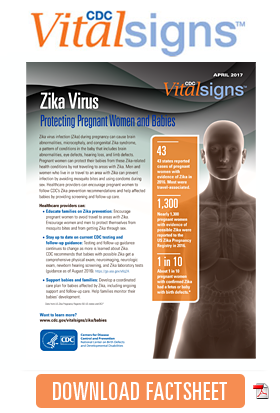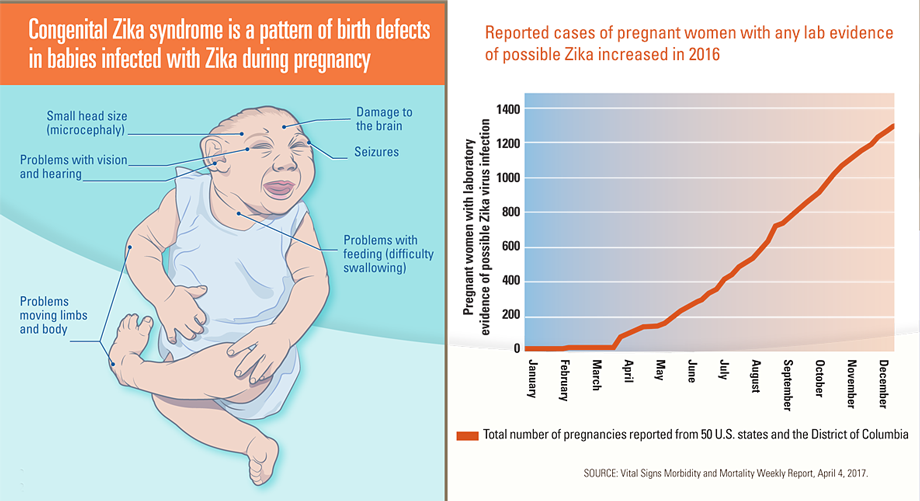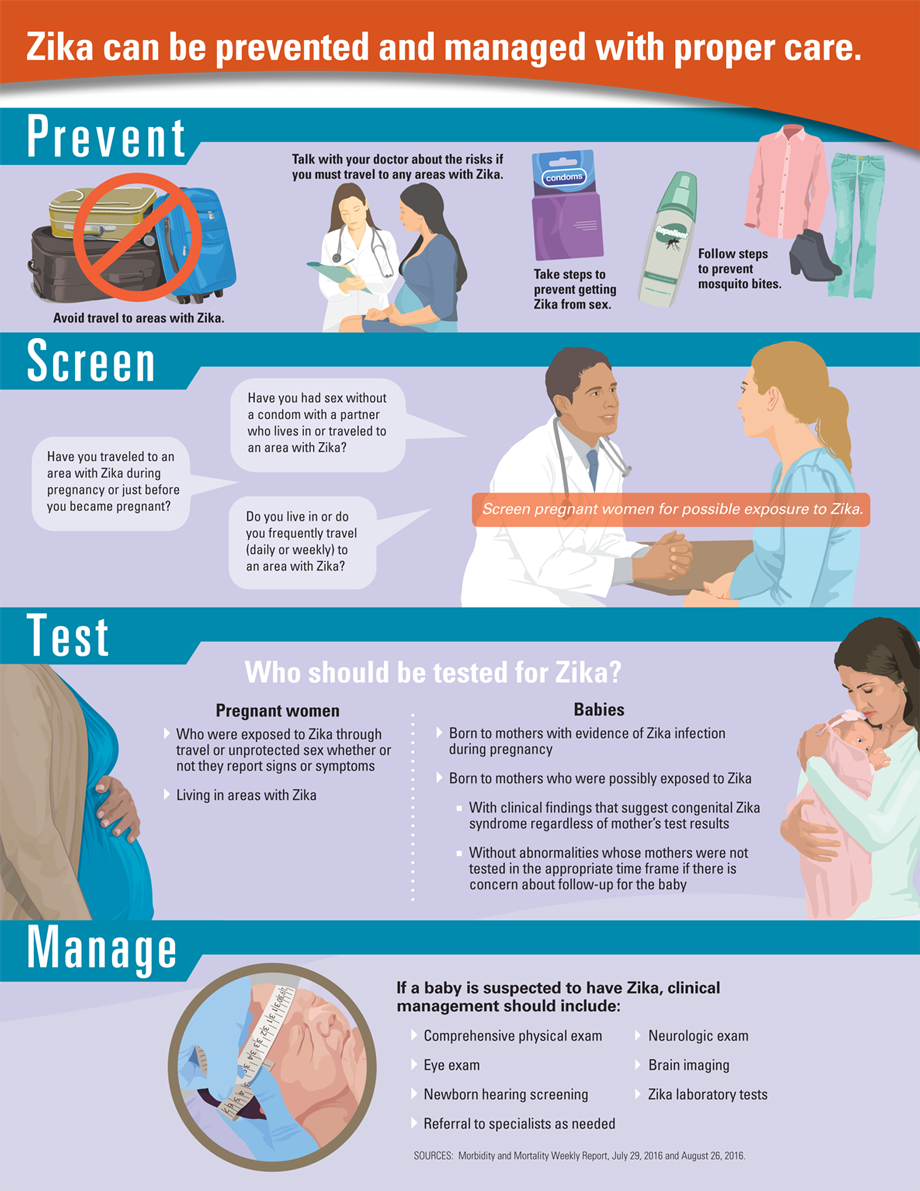Vital Signs: Zika Virus
Protecting Pregnant Women and Babies
Zika virus infection (Zika) during pregnancy can cause damage to the brain, microcephaly, and congenital Zika syndrome, a pattern of conditions in the baby that includes brain abnormalities, eye defects, hearing loss, and limb defects. Pregnant women can protect their babies from these Zika-related health conditions by not traveling to areas with Zika. Men and women who live in or travel to an area with Zika can prevent infection by avoiding mosquito bites and using condoms during sex. Healthcare providers can encourage pregnant women to follow CDC’s Zika prevention recommendations and help affected babies by providing screening and follow-up care.
Healthcare providers can:
- Educate families on Zika prevention: Encourage pregnant women to avoid travel to areas with Zika. Tell women and men how to protect themselves from mosquito bites and from getting Zika through sex.
- Ask about Zika and provide all needed tests and follow-up care: Guidance is updated as more is learned about Zika so check on current recommendations. Babies with possible Zika should get a comprehensive physical exam, neuroimaging, neurologic exam, newborn hearing screening, and Zika laboratory tests (guidance as of August 2016). https://go.usa.gov/xXq2A.
- Support babies and families: Develop a coordinated care plan for babies affected by Zika, including ongoing support, follow-up care, and linking to your local health department. Help families monitor their babies’ development.

44 states reported cases of pregnant women with evidence of Zika in 2016. Most were travel-associated.
About 1 in 10 pregnant women with confirmed Zika had a fetus or baby with birth defects.
Only 1 in 4 babies with possible congenital Zika were reported to have received brain imaging after birth.
Data from US Zika Pregnancy Registry (50 US states and DC)
Zika infection during pregnancy can cause serious birth defects in babies.
Babies affected by Zika may have long-term special needs.
- In the US in 2016, nearly 1,000 pregnant women with evidence of Zika completed their pregnancies and some had babies with Zika-related birth defects.
- 5% with possible Zika had birth defects
- 10% with confirmed Zika had birth defects
- 15% with confirmed Zika in the first trimester had birth defects
- Brain imaging at birth is critical to identify babies who may appear healthy but have underlying brain defects and to ensure they receive the care that they need.
To prevent Zika during pregnancy, pregnant women should:
- Avoid travel to areas with Zika. Pregnant women who must travel to an area with Zika should talk to their healthcare provider before traveling to understand the risks. https://wwwnc.cdc.gov/travel/page/zika-information
- Follow steps to prevent mosquito bites if they live in or travel to an area with Zika. https://go.usa.gov/xXqqW
- Avoid getting Zika by using condoms or not having sex if their sexual partner lives in or travels to an area with Zika. https://www.cdc.gov/zika/prevention/protect-yourself-during-sex.html
Possible Zika infection — Any lab evidence of recent Zika infection.
Confirmed Zika infection — A subgroup of possible Zika infection defined as presence of Zika virus or antibodies specific to Zika. Testing for Zika can only positively confirm Zika within a few weeks of infection – a special challenge when there are no symptoms.
The Federal government is
- Monitoring cases of infections among pregnant women to identify the long-term consequences of congenital Zika infection.
- Collaborating with clinical experts and organizations to update guidance as needed for healthcare providers on clinical management of pregnant women and babies affected by Zika.
- Researching factors that might affect birth defects in fetuses and babies, including the timing of Zika infection during pregnancy.
- Improving laboratory testing for Zika and providing state, tribal, local, and territorial health laboratories with diagnostic tests.
- Accelerating the development of a vaccine.
Healthcare providers can
- Educate families on Zika prevention: Encourage pregnant women to avoid travel to areas with Zika. Tell women and men how to protect themselves from mosquito bites and from getting Zika through sex.
- Ask about Zika and provide all needed tests and follow-up care: Guidance is updated as more is learned about Zika so check on current recommendations. Babies with possible Zika should get a comprehensive physical exam, neuroimaging, neurologic exam, newborn hearing screening, and Zika laboratory tests (guidance as of August 2016). https://go.usa.gov/xXq2A
- Support babies and families: Develop a coordinated care plan for babies affected by Zika, including ongoing support, follow-up care, and linking to your local health department. Help families monitor their babies’ development.
Health departments can
- Educate healthcare providers about Zika, guidance for evaluation and care of pregnant women and babies with possible Zika exposure, and the benefits of early identification and follow-up care.
- Coordinate testing for pregnant women and infants with possible Zika infection.
- Report all cases of pregnant women and babies with possible Zika infection to the US Zika Pregnancy Registry or the Puerto Rico Zika Active Pregnancy Surveillance System. https://www.cdc.gov/zika/reporting/index.html
- Ensure all babies possibly affected by Zika are identified and families are connected to appropriate medical and social services by coordinating Zika pregnancy registry with Zika-related birth defects surveillance activities.
Families can
- Prevent Zika during pregnancy by:
- Avoiding travel to areas with Zika. https://wwwnc.cdc.gov/travel/page/zika-information
- Protecting themselves from mosquito bites or from getting Zika through sex if they live in or travel to an area with Zika.
- Help their baby if he or she is exposed to Zika during pregnancy by:
- Getting the recommended screenings and follow-up care.
- Working with their healthcare providers to create a coordinated care plan.
- Monitoring their baby’s development using CDC’s milestone checklists. https://go.usa.gov/xXrMf
- Contacting early intervention services in their community to find out if their baby is eligible for services that can help.
Issue Details
- Vital Signs Issue details: Zika Virus, Morbidity and Mortality Weekly Report (MMWR)
- Vital Signs – Zika Virus [PODCAST – 1:15 minutes]
- Vital Signs – Zika Virus [PSA – 0:60 seconds]
- CDC Zika 101 Video
- Vital Signs – Zika and Pregnancy
- MMWR Zika Reports
- CDC Zika Website
- CDC: Build a Zika Prevention Kit
- CDC Zika Virus: Symptoms, Testing, & Treatment
- CDC Zika Virus: Zika and Sexual Transmission
- CDC Zika Virus: Pregnancy
- CDC Zika Virus: Parents
- CDC Zika Virus: Microcephaly & Other Birth Defects
- CDC Zika Virus: For Healthcare Providers
- CDC Zika Virus: Reporting and Surveillance
- CDC Zika Virus: Areas with Zika
- CDC Travelers’ Health: Zika Travel Information
- CDC’s Evaluation & Testing for Zika Virus
- Update: Interim Guidance for the Evaluation and Management of Infants with Possible Congenital Zika Virus Infection — United States, August 2016. MMWR
- Update: Interim Guidance for Health Care Providers Caring for Pregnant Women with Possible Zika Virus Exposure — United States, July 2016. MMWR
- MedlinePlus – Zika Virus
- MedlinePlus – Infections and Pregnancy
- American Congress of Obstetricians and Gynecologists — Zika Virus: Guidance and Information for Health Care Providers
- American Medical Association: Zika Virus Resource Center
- March of Dimes: Zika
- Association of State and Territorial Health Officials: Zika Virus
- American Academy of Pediatrics – Zika Virus: What Parents Need to Know
- American Congress of Obstetricians and Gynecologists: Zika Virus Resource Summary for Ob-Gyns and Health Care Providers



